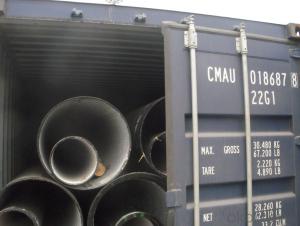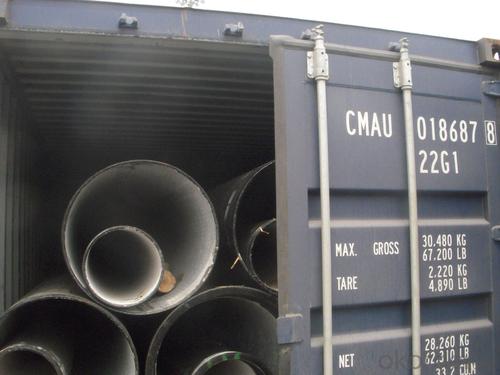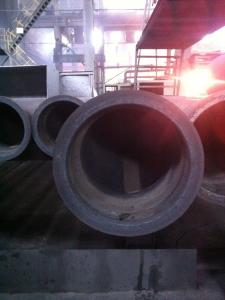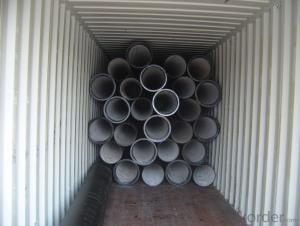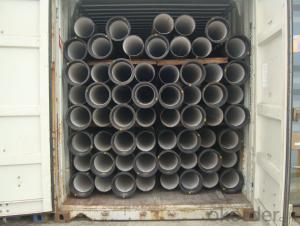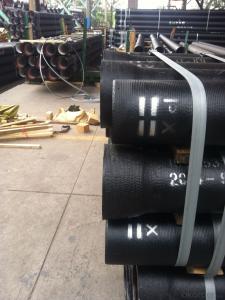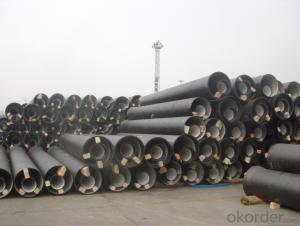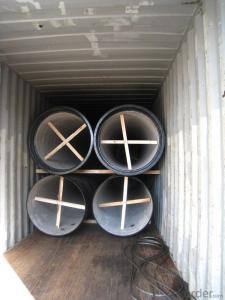DUCTILE IRON PIPES AND PIPE FITTINGS k8 CLASS DN1200
- Loading Port:
- Tianjin
- Payment Terms:
- TT OR LC
- Min Order Qty:
- 22 pc
- Supply Capability:
- 3000 pc/month
OKorder Service Pledge
OKorder Financial Service
You Might Also Like
Material : Ductile Cast Iron
Size Range : DN 80mm to DN 2000mm
Unit Effective Length : 6m or 5.7m
Manufacture Standard: ISO 2531:1998/ EN 545:2006/EN 598:2007
Annual capacity : 200,000 tons
Coating Exterior: Zinc 130g/m2 according to ISO 8179-1 and bitumen coating 70 microns.
Cement Interior: Portland Cement/ High Alumina Cement/ Sulphate Resisting Cement Lining according to ISO 4179
Special requirements on external coating and internal lining can be applied
We also provide accessories such as SBR/EPDM rubber gaskets, lubricant paste, pipe caps, PE sleeves, etc.
Additional Parts:
Each pipe is strictly inspected according to related standard to ensure permanently high performance.
Easy Installation at site and service free for life
Long Service Lifespan
Quotation will arrive you within 24hours once we get your inquiry.
We guarantee offering you a competitive price.
A copy of original inspection reports of pipes will be offered after shipment.
Photos of loading process will be sent to the customer after shipment effect.
We will follow-up the delivery progress after shipment effect and update to the customer on weekly basis.
- Q: How do ductile iron pipes handle heavy traffic loads?
- Ductile iron pipes possess exceptional durability and have the ability to effortlessly withstand heavy traffic loads. This is primarily attributed to their remarkable strength and flexibility. The incorporation of graphite nodules in the composition of ductile iron allows for greater flexibility compared to traditional cast iron pipes. This enhanced flexibility empowers the pipes to endure substantial traffic loads, including the weight of vehicles traversing over them. Moreover, ductile iron pipes exhibit an elevated load-bearing capacity, enabling them to bear significant weights without experiencing any deformation or structural failure. Consequently, they are well-suited for deployment in areas characterized by heavy traffic, such as highways, bridges, and industrial sites. Furthermore, ductile iron pipes showcase exceptional resistance to external forces, such as vibrations and impacts. These pipes can effectively absorb and distribute these forces across the entire pipe network, thereby averting any potential damage and preserving the overall structural integrity. In conclusion, ductile iron pipes are explicitly engineered to manage the demands imposed by heavy traffic loads. Their strength, flexibility, and load-bearing capacity render them a dependable choice for infrastructure projects where durability and longevity are of utmost importance.
- Q: Can ductile iron pipes be used for slurry transportation?
- Yes, ductile iron pipes can be used for slurry transportation. Ductile iron pipes are known for their high strength and durability, making them suitable for various applications including slurry transportation. Slurry is a mixture of solid particles and a liquid, which can be abrasive and corrosive. Ductile iron pipes have excellent resistance to abrasion, corrosion, and erosion, making them capable of handling the challenges posed by slurry transportation. Additionally, ductile iron pipes offer a smooth inner surface, reducing friction and improving the flow of slurry. Therefore, ductile iron pipes are a reliable choice for slurry transportation systems in industries such as mining, wastewater treatment, and oil and gas.
- Q: Can ductile iron pipes be used in areas with high levels of industrial effluents?
- Yes, ductile iron pipes can be used in areas with high levels of industrial effluents. Ductile iron is highly resistant to corrosion, making it suitable for handling various industrial waste streams and chemicals commonly found in effluents. Its durability and strength make it an ideal choice for such environments, ensuring long-term reliability and performance.
- Q: How are ductile iron pipes transported and stored?
- To ensure the safety and integrity of ductile iron pipes, a systematic and cautious approach is taken during their transportation and storage. Typically, specialized vehicles such as flatbed trucks or trailers are used to transport ductile iron pipes. These vehicles are specifically designed to accommodate the size and weight of the pipes. They are equipped with securing mechanisms that effectively prevent any movement or damage during transit. Forklifts or cranes are used to load the pipes onto the vehicles, ensuring proper support and balance to prevent bending or deformation. To protect the pipes from external factors that may cause damage, measures are taken during transportation. Covers or wraps are placed over the pipes to shield them from adverse weather conditions such as rain, snow, or excessive sunlight. Straps or chains are also used to secure the pipes, preventing any shifting or rolling during transit. During storage, ductile iron pipes are stacked horizontally on specially designed racks or supports. This ensures even weight distribution and minimizes the risk of deformation or stress on the pipes. The storage area must be clean, dry, and well-ventilated to prevent corrosion or deterioration. It is crucial to handle ductile iron pipes with care to avoid impact or rough handling that could result in cracks or fractures. Workers involved in the transportation and storage process must receive proper training to ensure they adhere to protocols and use the necessary equipment, including lifting machinery and protective gear. Regular inspections of transported and stored ductile iron pipes are necessary to identify any signs of damage or corrosion. This allows for timely repairs or replacements, preventing any issues when the pipes are installed for their intended use. In conclusion, the transportation and storage of ductile iron pipes necessitate meticulous planning, appropriate equipment, and adherence to safety protocols to maintain their condition and performance.
- Q: What is the expected roughness coefficient of ductile iron pipes?
- The expected roughness coefficient of ductile iron pipes can vary depending on various factors such as pipe diameter, age, and condition. However, in general, the roughness coefficient for ductile iron pipes is typically around 0.01-0.015 mm. This value represents the average roughness of the internal surface of the pipe and is used in hydraulic calculations to determine the flow characteristics and pressure losses within the pipe network. It is important to note that these values are approximate and can vary based on specific pipe conditions and applications.
- Q: There are several forms of flexible interfaces for Spigot Cast Iron Pipes
- Socket type cast iron pipe rigid interface antiallergic can, under the action of external force, no tower water supply equipment interface packing easy fragmentation and leakage, especially in the weak foundation and uneven subsidence area and the earthquake zone. The interface damage rate is higher. Therefore, flexible interfaces should be adopted under the above unfavorable conditions.
- Q: Can ductile iron pipes be used in areas with high soil acidity and alkalinity?
- Ductile iron pipes can generally be used in areas with high soil acidity and alkalinity. However, it is important to consider the specific conditions and take appropriate measures to mitigate the potential effects of these soil characteristics on the pipes. In areas with high soil acidity, the acidic conditions can promote corrosion of metal pipes, including ductile iron. To prevent this, protective measures such as applying an external coating or using cathodic protection can be implemented. These measures help to create a barrier between the pipe and the corrosive environment, extending the longevity of the pipes. Similarly, in areas with high soil alkalinity, the alkaline conditions can also have an impact on the performance of ductile iron pipes. Alkaline soils can cause the formation of calcium carbonate deposits, commonly known as scale, which can reduce the flow capacity of the pipes over time. Regular maintenance and cleaning of the pipes can help mitigate the effects of scale buildup. It is worth noting that the suitability of ductile iron pipes in areas with high soil acidity and alkalinity may also depend on the specific grade and quality of the pipes. Manufacturers often provide guidelines and recommendations regarding the use of their products in various environmental conditions. It is advisable to consult with pipe manufacturers or industry experts to ensure proper selection and installation of ductile iron pipes in such areas.
- Q: Can ductile iron pipes be used for gravity flow applications?
- Yes, ductile iron pipes can be used for gravity flow applications. Ductile iron pipes are known for their strength, durability, and ability to handle high-pressure flow, making them suitable for various gravity flow systems such as sewage, stormwater, and water distribution networks.
- Q: What is the expected deflection capability of ductile iron pipes?
- The expected deflection capability of ductile iron pipes is typically around 2-5% of the pipe diameter, allowing them to withstand moderate levels of ground movement or settlement without experiencing significant structural damage.
- Q: Can ductile iron pipes be used for irrigation pivot systems?
- Indeed, irrigation pivot systems can utilize ductile iron pipes. Renowned for their robustness, longevity, and resistance to corrosion, ductile iron pipes are apt for numerous purposes, including irrigation. These pipes have the capability to withstand substantial water pressure, guaranteeing a dependable and enduring means of transporting water to irrigation pivot systems. Moreover, ductile iron pipes harmonize seamlessly with a variety of fittings and connectors commonly employed in irrigation systems, thereby facilitating effortless installation and upkeep. All in all, employing ductile iron pipes in irrigation pivot systems emerges as a pragmatic decision that ensures efficacious water distribution while minimizing the likelihood of pipe failure.
Send your message to us
DUCTILE IRON PIPES AND PIPE FITTINGS k8 CLASS DN1200
- Loading Port:
- Tianjin
- Payment Terms:
- TT OR LC
- Min Order Qty:
- 22 pc
- Supply Capability:
- 3000 pc/month
OKorder Service Pledge
OKorder Financial Service
Similar products
Hot products
Hot Searches
Related keywords
